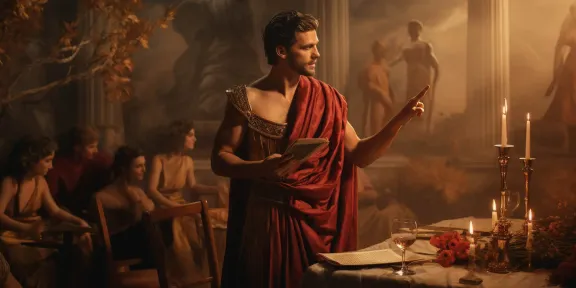
Marcus Aurelius
Marcus Aurelius Frequently Asked Questions
Who was Marcus Aurelius?
- Marcus Aurelius was a Roman Emperor who ruled from 161 to 180 AD and is best known for his philosophical writings.
What is Marcus Aurelius known for?
- Marcus Aurelius is known for his work "Meditations," a collection of personal writings that reflect his Stoic philosophy and thoughts on leadership.
Was Marcus Aurelius a Stoic philosopher?
- Yes, Marcus Aurelius was a practitioner of Stoicism, a philosophy that emphasizes personal virtue, reason, and the importance of living in harmony with nature.
When did Marcus Aurelius become Emperor?
- Marcus Aurelius became Emperor of Rome in 161 AD, following the death of his adoptive father, Emperor Antoninus Pius.
How long did Marcus Aurelius rule as Emperor?
- Marcus Aurelius ruled as Emperor for 19 years, until his death in 180 AD.
What impact did Marcus Aurelius have on the Roman Empire?
- Marcus Aurelius is often remembered as one of the "Five Good Emperors" of Rome for his efforts to uphold justice, promote peace, and improve the welfare of his subjects.
Did Marcus Aurelius participate in military campaigns?
- Yes, Marcus Aurelius was actively involved in military campaigns against Germanic tribes along the northern borders of the Roman Empire.
What were some of Marcus Aurelius's key philosophical beliefs?
- Marcus Aurelius believed in the importance of self-discipline, rationality, and the acceptance of events outside of one's control.
What led Marcus Aurelius to write "Meditations"?
- Marcus Aurelius wrote "Meditations" as a form of self-reflection and guidance on how to navigate life's challenges with virtue and inner peace.
What language did Marcus Aurelius write "Meditations" in?
- Marcus Aurelius wrote "Meditations" in Greek, as it was the common language of the educated elite in the Roman Empire at the time.
Was Marcus Aurelius a respected leader during his reign?
- Yes, Marcus Aurelius was widely respected for his intellectual pursuits, moral integrity, and dedication to public service.
How did Marcus Aurelius balance his duties as Emperor with his philosophical pursuits?
- Marcus Aurelius practiced Stoicism as a way to maintain a sense of inner calm and ethical clarity amidst the demands of ruling an empire.
Did Marcus Aurelius have any notable conflicts with other Roman figures during his reign?
- Marcus Aurelius faced challenges from internal political rivals and external threats to the Roman Empire, which he navigated with a focus on justice and diplomacy.
How did Marcus Aurelius die?
- Marcus Aurelius died in 180 AD, likely from natural causes, while on a military campaign in present-day Austria.
Did Marcus Aurelius have an heir to succeed him as Emperor?
- Yes, Marcus Aurelius appointed his son, Commodus, as his co-emperor and designated successor, despite concerns about Commodus's fitness to rule.
How has Marcus Aurelius's philosophy influenced modern thought?
- Marcus Aurelius's Stoic philosophy, as outlined in "Meditations," continues to inspire people seeking wisdom, resilience, and moral guidance in the face of life's challenges.
Was Marcus Aurelius's reign considered a prosperous time for the Roman Empire?
- Despite facing external challenges and internal unrest, Marcus Aurelius's reign is often regarded as a period of relative stability and prosperity for the Roman Empire.
What were some of the key themes in Marcus Aurelius's "Meditations"?
- Some key themes in "Meditations" include the importance of self-awareness, humility, acceptance of fate, and the pursuit of wisdom and virtue.
How was Marcus Aurelius perceived by his contemporaries?
- Marcus Aurelius was generally well-regarded by his contemporaries for his intellectual pursuits, ethical leadership, and dedication to the welfare of the Roman Empire.
How has Marcus Aurelius been remembered in history?
- Marcus Aurelius has been remembered as a thoughtful and principled leader, whose Stoic philosophy and writings continue to resonate with readers seeking wisdom and guidance in navigating life's complexities.

